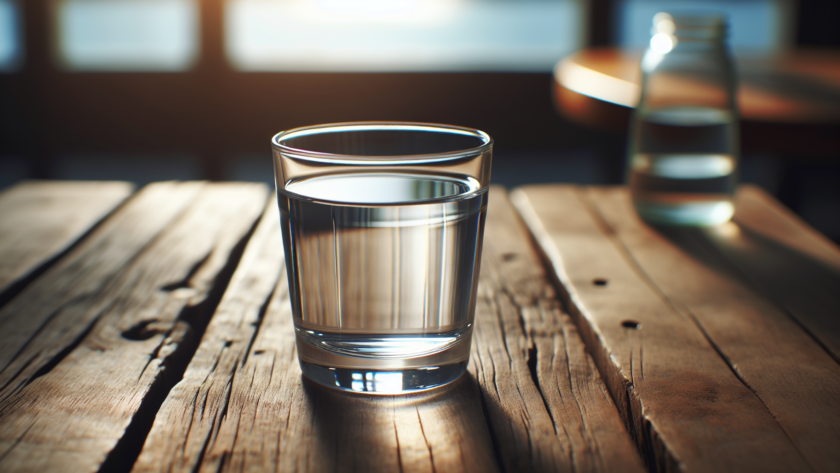Do you ever wonder how staying properly hydrated can benefit your overall health? It turns out that hydration plays a vital role in maintaining our well-being. From improving digestion to enhancing cognitive function, staying hydrated can have a positive impact on various aspects of our health. Whether it’s increasing energy levels or promoting healthier skin, understanding the importance of hydration is key to achieving optimal wellness. In this article, we will explore the numerous ways in which hydration can positively influence your overall health and well-being. So grab a glass of water and let’s dive in!
The importance of hydration
Water is essential for life
Water is an essential component of our bodies, making up about 60% of our total body weight. It plays a vital role in maintaining the overall health and well-being of each and every cell in our body. Without adequate hydration, our body cannot function properly, and this can lead to a variety of health issues.
Regulation of body temperature
One of the key functions of water in our body is to regulate body temperature. When we sweat, water from our body evaporates and cools down our skin, preventing overheating. Proper hydration ensures that our body can effectively control its temperature, allowing us to perform optimally in both hot and cold environments.
Transportation of nutrients and oxygen
Water acts as a medium for transporting essential nutrients and oxygen to our cells. It helps dissolve vital substances like vitamins, minerals, and glucose and carries them to different parts of our body. Without adequate hydration, the transportation of these important nutrients would be hindered, negatively affecting our overall health and functioning.
Removal of waste products
Water is crucial for the removal of waste products from our body. It helps transport waste materials through our kidneys and out of our body through urine. Additionally, water is involved in other excretory processes, such as sweating and bowel movements. Sufficient hydration ensures that these waste products are efficiently eliminated, preventing the buildup of toxins in our body.
Effects of dehydration on the body
Reduced physical performance
When you are dehydrated, your physical performance can suffer significantly. Even mild dehydration can lead to fatigue, decreased endurance, and reduced strength. This can affect your ability to engage in physical activities or perform at your best during workouts and sports.
Impaired cognitive function
Hydration has a direct impact on our cognitive function and mental clarity. Dehydration can impair our ability to think, concentrate, and remember, leading to decreased productivity and poor decision-making. By staying properly hydrated, you can ensure optimal brain function and maintain mental sharpness throughout the day.
Digestive problems
Insufficient hydration can have negative effects on our digestive system. Water is essential for proper digestion and nutrient absorption. Without enough water, we may experience digestive problems such as constipation, bloating, and indigestion. By keeping ourselves adequately hydrated, we support healthy digestion and prevent discomfort and digestive issues.
Increased risk of kidney stones
Dehydration greatly increases the risk of developing kidney stones. When you are dehydrated, your urine becomes more concentrated, leading to an increased likelihood of minerals crystallizing and forming stones in your kidneys. By maintaining proper hydration, you can help prevent the formation of kidney stones and protect your kidney health.
Hydration and digestion
Maintaining proper digestive function
Proper hydration is essential for maintaining optimal digestive function. Water helps in the breakdown of food, allowing for proper digestion and absorption of nutrients. It also helps to soften stools, making them easier to pass through the intestines. By staying hydrated, you can support the overall health and function of your digestive system.
Prevention of constipation
One common digestive issue that can be prevented through hydration is constipation. When your body lacks sufficient water, it can result in hard, dry stools that are difficult to pass. By drinking an adequate amount of water daily, you can help prevent constipation and ensure regular bowel movements.
Improvement in nutrient absorption
Water plays a crucial role in the absorption of nutrients from the food we eat. It helps break down food into smaller particles, allowing for better absorption of essential vitamins, minerals, and other nutrients in the intestines. By staying properly hydrated, you can enhance nutrient absorption and maximize the benefits of a healthy diet.
Hydration and brain function
Influence on cognitive performance
Proper hydration is vital for optimal brain function. Research has shown that even mild dehydration can lead to decreased cognitive performance, including impaired memory, difficulty focusing, and reduced alertness. By maintaining adequate hydration levels, you can support optimal brain function, enhance cognitive abilities, and improve overall mental performance.
Prevention of headaches
Dehydration is a common trigger for headaches and migraines. Headaches caused by dehydration are often accompanied by symptoms such as dizziness, fatigue, and difficulty concentrating. By staying hydrated, you can reduce the frequency and severity of headaches and promote overall headache-free well-being.
Mood regulation
Water plays a crucial role in maintaining a balanced mood. Dehydration can affect mood and lead to feelings of irritability, anxiety, and even depression. By ensuring that you are properly hydrated, you can support the regulation of mood and promote a more positive and stable emotional state.
Hydration and heart health
Maintaining blood volume and circulation
Adequate hydration is essential for maintaining proper blood volume and circulation. When you are dehydrated, your blood becomes thicker and more viscous, making it harder for your heart to pump blood throughout your body. By staying properly hydrated, you can support optimal blood volume and circulation, reducing the workload on your heart.
Regulation of blood pressure
Hydration plays a crucial role in blood pressure regulation. When you are well-hydrated, your blood vessels are more dilated, allowing blood to flow more freely and reducing the risk of high blood pressure. By ensuring proper hydration, you can help regulate your blood pressure and promote heart health.
Prevention of cardiovascular diseases
Chronic dehydration has been linked to an increased risk of developing cardiovascular diseases such as heart disease and stroke. Proper hydration helps maintain the health and integrity of your cardiovascular system, reducing the risk of these potentially life-threatening conditions. By staying adequately hydrated, you can support a healthy heart and reduce the likelihood of cardiovascular diseases.
Impact of hydration on skin
Promotion of healthy skin
Proper hydration is essential for maintaining healthy, glowing skin. Water helps to hydrate our skin cells from the inside, giving our skin a plump and youthful appearance. It also assists in maintaining the skin’s natural elasticity and overall texture. By staying well-hydrated, you can promote healthy skin and achieve a vibrant complexion.
Prevention of dryness and wrinkles
Dehydration can lead to dryness and increased vulnerability to wrinkles and fine lines. When your skin lacks moisture, it becomes less resilient and more prone to damage. By keeping yourself properly hydrated, you can help prevent skin dryness, maintain its natural moisture barrier, and reduce the formation of wrinkles.
Improvement in skin elasticity
Adequate hydration is crucial for maintaining the elasticity of our skin. When our body is well-hydrated, our skin cells are plump and well-nourished, which helps maintain the skin’s elasticity and firmness. By prioritizing hydration, you can support the natural elasticity of your skin and promote a more youthful appearance.
Hydration and athletic performance
Optimal fluid balance for physical activity
Proper hydration is vital for achieving peak athletic performance. When you exercise, you lose fluids through sweat, and if these fluids are not adequately replaced, it can lead to dehydration. By maintaining optimal fluid balance through regular hydration, you can enhance your performance, endurance, and overall athletic capabilities.
Prevention of muscle cramps
Muscle cramps are a common occurrence during intense physical activity and can be caused by dehydration. When you are dehydrated, your muscles are more prone to cramping and spasms. By staying properly hydrated, particularly before and during exercise, you can help prevent muscle cramps and ensure smooth muscle function during workouts.
Enhanced endurance and recovery
Proper hydration plays a significant role in enhancing endurance and facilitating post-workout recovery. Hydration helps maintain muscle function and minimizes the risk of muscle fatigue during prolonged exercise. Additionally, adequate hydration supports proper recovery by replenishing lost fluids and aiding in the repair and growth of muscles.
Hydration and kidney function
Filtration and elimination of waste products
Hydration is crucial for the proper functioning of our kidneys, which play a vital role in filtering waste products from our blood and producing urine. When you are adequately hydrated, it helps ensure optimal kidney function, allowing for efficient removal of waste products and toxins from your body.
Prevention of kidney stones
Kidney stones are a common kidney-related issue that can be prevented through proper hydration. When your urine is diluted with enough water, it helps prevent the formation of mineral crystals that can lead to the development of kidney stones. By staying well-hydrated, you can reduce the risk of kidney stones and support the health of your kidneys.
Reduction of urinary tract infections
Dehydration can increase the risk of developing urinary tract infections (UTIs). When you are dehydrated, your urine becomes more concentrated, creating an environment that is favorable for the growth of bacteria. By staying properly hydrated, you can promote urine dilution and reduce the likelihood of UTIs.
Hydration and weight management
Increased satiety and reduced calorie intake
Proper hydration can aid in weight management by increasing feelings of satiety and reducing calorie intake. Drinking water before meals can help you feel fuller, potentially leading to consuming fewer calories. Additionally, thirst is often mistaken for hunger, so staying hydrated can prevent unnecessary snacking and overeating.
Support for metabolic processes
Water is essential for various metabolic processes in our body, including the breakdown and utilization of nutrients. Hydration helps to support a healthy metabolism, aiding in the efficient digestion and absorption of nutrients. By staying hydrated, you can optimize your body’s metabolic functions and promote overall wellness.
Enhanced exercise performance for weight loss
Proper hydration is crucial for those aiming to lose weight through exercise. Drinking enough water before, during, and after your workout can help regulate body temperature, maintain energy levels, and promote better performance. By staying properly hydrated during physical activity, you can improve your exercise efficiency and ultimately support your weight loss goals.
Tips for staying hydrated
Drink an adequate amount of water
The simplest and most effective way to stay hydrated is by drinking an adequate amount of water throughout the day. The general recommendation is to drink around 8 cups (64 ounces) of water daily, but individual needs may vary depending on factors such as activity level, climate, and overall health.
Consider fluid-rich foods and beverages
In addition to water, you can also obtain hydration from fluid-rich foods and beverages. Include items such as soups, fruits, vegetables, and herbal tea in your diet to supplement your water intake. These foods and beverages not only provide hydration but also offer additional vitamins, minerals, and antioxidants for overall health and well-being.
Monitor urine color and frequency
A simple way to assess your hydration level is by monitoring the color and frequency of your urine. Ideally, your urine should be light yellow or clear. Dark yellow or amber-colored urine may indicate dehydration, so it’s important to increase your fluid intake. Aim to urinate regularly throughout the day to ensure proper hydration.
Hydrate before, during, and after physical activity
When engaging in physical activity, it’s crucial to prioritize hydration. Drink water before starting your workout, and continue to sip water or sports drinks during exercise to replenish lost fluids. After your workout, be sure to hydrate again to aid in recovery and rehydrate your body.
In conclusion, hydration plays a vital role in our overall health and well-being. It is essential for various bodily functions, including regulating body temperature, transporting nutrients, eliminating waste products, and supporting organ function. By staying properly hydrated, we can enhance physical performance, maintain cognitive function, improve digestion, support heart health, promote healthy skin, optimize athletic performance, aid kidney function, manage weight, and promote overall wellness. Remember to drink an adequate amount of water, consume fluid-rich foods and beverages, monitor urine color and frequency, and prioritize hydration during physical activity. By making hydration a priority, you can reap the numerous benefits it offers and optimize your health and vitality. Stay hydrated, stay healthy!




